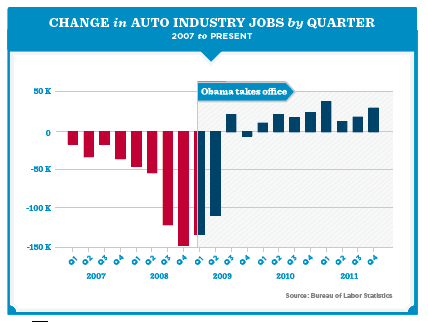President Barack Obama participates in a roundtable meeting with students at Lorain County Community College in Elyria, Ohio, April 18, 2012.
It must be general election time. “Real people,” that mythical breed of talking-point-driven, down-home American, have been unleashed in Ohio. They will be trotted out like exotic animals throughout Ohio this week, as the Obama campaign launches a real “Made in Ohio” Auto Tour, with stops in real places like Lyma, Akron, Avon Lake and Perrysburg. At each stop, the “real people” will talk about their “real” jobs in the “real” auto industry that President Obama played a major role in saving from liquidation in 2009. “One in eight jobs in Ohio is tied to the auto industry,” said Bob King, the head of the United Auto Workers, an Obama supporter, on a campaign conference call Monday morning. “Every job is a real person with a real story here in Ohio.”
To prove his point, King turned the call over to a real woman named Dawn, who got her job back in the Ohio auto industry after the economic recession. “If it weren’t for the President’s auto rescue, I probably still wouldn’t be working,” she told reporters.
There is a real reason that the Obama campaign is calling on real people at just this moment. Once again, Ohio is set up to be a perfect microcosm for the coming national campaign: A closely divided state in the industrial Midwest that suffered horribly during the great recession, while also benefiting from some of President Obama’s economic rescue policies.
Just last week, both Mitt Romney and Barack Obama traveled to Ohio to worship in their respective temples of symbolism. For the President, that was a local community college, where Obama boasted of his efforts to retrain and reeducate laid off workers. For Romney, it was a shuttered Gypsum factory, where under a sign that read “Obama Isn’t Working,” the presumptive Republican nominee pointed the finger at his rival. “If you want to know where his vision leads, open your eyes because we have been living it for the last three years. It leads to lost jobs, lost homes, lost dreams,” Romney said.
Indeed, as the Romney campaign is eager to point out, the great recession has not been good for the Ohio economy. The state has lost 67,100 jobs since Obama took office, including 22,300 manufacturing jobs. The Obama campaign has countered by pointing out that the job loss was driven by a financial collapse that began before he took office, while arguing that the President saved tens of thousands of Ohio jobs by rescuing General Motors and Chrysler. On the Monday call, King said there were 105,000 auto industry related jobs in Ohio at the point of bankruptcy for those two companies in 2009. “Today it’s 120,000 people,” he said. The campaign even released a nifty infographic on Monday to make its point:
Romney, who opposed the Obama bailout of the auto industry, and supported a different government-backed restructuring plan in 2009, has been hurt in the Midwest for his tough talking opposition to the Obama bailout. In Michigan, Romney’s native state, the polls have turned so sour for Michigan that Obama campaign officials have begun focusing their attention elsewhere. Unwilling to litigate the complex details of his disagreement over the bailout with the Obama campaign, Romney has responded by trying to characterize the bailout as nothing more than a corrupt, special interest ploy. “Remarkably, President Obama’s allies have attempted to justify his $80 billion auto bailout,” said Ohio Rep. Mike Turner, a Romney supporter, in a statement to the press meant to counter the “real people” tour. “Governor Romney will make decisions based on what’s best for the economy and for American workers, not based on political favoritism and backroom deals.” Turner’s reference to Obama’s $80 billion bailout is misleading, since a big chunk of that money–about $13 billion–was awarded by George W. Bush. About half of it has already been paid back, with more expected to be recovered in the coming years.
And so we have some clear dividing lines for the coming campaign. When Romney talks about lost manufacturing jobs, Obama will talk about the auto industry. When Obama talks about the auto industry, Romney will talk about the autoworkers unions.
And both sides will deploy “real people” to do their bidding, though so far this week, Obama is pulling ahead in the real people race. The Romney campaign has been busy reorganizing itself, and has yet to deploy the sort of organizational moxie that a multi-city “real people” swing state tour would require. “Each of the stops will be tailored to the local communities,” explains Jessica Kershaw, the campaign’s Ohio spokeswoman.
But that doesn’t mean that Romney doesn’t know how to play the real people game. Here is an example from last year:
[youtube=http://www.youtube.com/watch?v=yj6yFmOnlXw]


